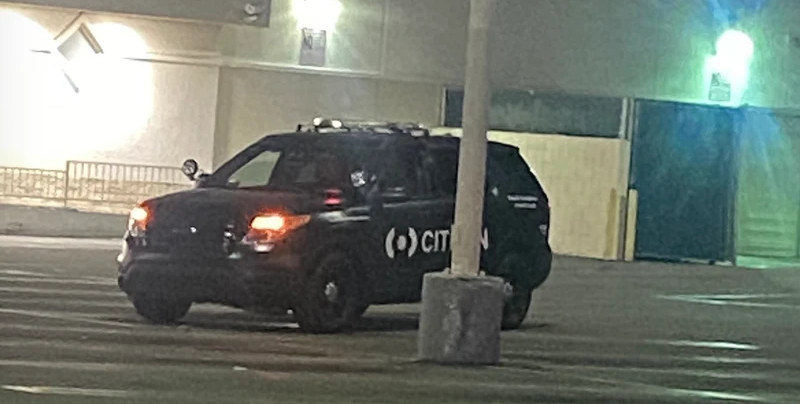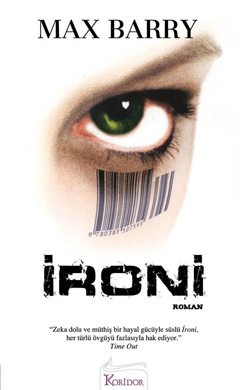Jennifer Government Blog
Displaying blogs about Jennifer Government. View all Max's blogs
My Take on Citizen
![]() A few people have asked for my opinion on the excellent new app/dial-a-vigilante service “Citizen.”
I’m qualified to speak on this, because Citizen is a lot like The Police from
my novel Jennifer Government, only more app-y.
A few people have asked for my opinion on the excellent new app/dial-a-vigilante service “Citizen.”
I’m qualified to speak on this, because Citizen is a lot like The Police from
my novel Jennifer Government, only more app-y.

If I have this right, you subscribe for $19.99 per month and in return you get the ability to dispense violent justice to your enemies. They don’t actually say that. They say you get a digital bodyguard to monitor you plus an instant emergency security response, which may include a cool custom-branded attack car, to your location. If I’m paying $19.99 per month, though, I expect them to take my side in any kind of he-said, she-said situation. I’m the customer. So if they want my continued business, I don’t want to hear any, “Actually, that man lives in the neighborhood and has a right to be there” nonsense. I want them to get in there and start intimidating.
My main concern is that these subscription models can be hard to exit. You know how it is: It’s easy to sign up, but when you try to cancel, there are all these extra steps. Sometimes you have to talk to someone on the phone and explain yourself. I worry that process is extra awkward when you’re dealing with a company that feeds on your fears and knows everything about where you go and what you do. When I unsubscribe, I don’t want to have to wonder whether Citizen is out there, in the dark, feeling aggrieved.
I also worry about backing the wrong horse. Sure, today, it’s just Citizen, but what about when there are two or three of them? Now I have to worry that Vigilantes R Us is going to see my Citizen bumper sticker and slash my tires. Because obviously it makes sense, from a marketing/PR point of view, to get the idea out there that your competitors aren’t quite as capable of delivering a full-service violent defense. If people start thinking that Citizen can’t even protect its customers’ tires, that’s a selling point for Vigilantes R Us. I’m not saying that Vigilantes R Us would go around deliberately attacking Citizen clients or anything, of course, or that we’d wind up in a full-scale armed corporate conflict. I’m just saying, that would be a free market solution.
On balance, I’m excited. The main problem with traditional law enforcement, of course, has been that you can’t pay more money to purchase a superior service. Well, you can. Let’s be real. But this new model allows us to dispense with the charade and go right ahead delivering tiered justice, where a little money gets a little justice, no money gets no justice, and a lot of money gets special premium justice.
Of course, Citizen and the like would naturally target the most profitable forms of justice, so what’s left to departmental police forces will be the costly parts of justice that don’t bring in money. Then there will be sinkholes in public budgets and restless taxpayers wondering why public law enforcement is so expensive when they could pay $19.99 to sign up to a professional organized justice syndicate. But that’s progress, baby.
More Max Content
![]() I got a reply from that high school teacher who asked
what Jennifer Government really meant.
You can read it
here but this is the part I especially liked:
I got a reply from that high school teacher who asked
what Jennifer Government really meant.
You can read it
here but this is the part I especially liked:
I wish you could hear all of my students’ reactions to this book over the years— this is one of the books they go absolutely ballistic over, and it’s such a joy to hear them discuss it. The first year I did it, I split the ninth grade into Team Advantage, US Alliance, and the Government, and we had an interactive (completely non-violent, I promise) marketing simulation. It was part of a media literacy unit and the two loyalty programs had to recruit as many members from the other grades as they could, while the Government group watched for ethics violations. That group of kids still talks fondly about the book. There has been a solid lack of engagement overall with distance learning this year, but we got to this book, and suddenly there were signs of life! It’s great to be able to teach it.
So Elizabeth is one awesome teacher.
In other news, there is more of my stuff headed your way. You know how I said I was working on a bunch of different things that would probably all finish around the same time, and that totally sounded like an excuse. Well, they all finished around the same time. Maybe not all of them. Some I gave up on. They were trash. But a few, I finished.
So there will be a new audio-book in 2021: “Discordia.” It’s a novel, but you listen to it. I don’t know when it will come out exactly or who will narrate it. I’ll let you know on that. But it will exist.
That’s plus Providence hitting paperback on May 4, 2021, and the new flagship book The 22 Murders of Madison May releasing in hardcover on July 6, 2021. When you have multiple books in one year, you get to call one of them a flagship. I heard that somewhere.
And if that’s not enough, I inked a TV deal for my short story, “It Came From Cruden Farm.” You can read that one for free right now on Slate.com. Not easily, because they refused to indent the paragraphs properly. Site-wide company formatting standards, blah blah blah. I was like, “This is like hanging the Mona Lisa under florescent lights,” and they were like, “I’m not sure it is,” and in the end we compromised on doing it their way. Anyway, it’s there. And you might also be able to watch it, at some point in the future. It’s with Disney/Fox, so, to be honest, I’m not totally sure they didn’t buy the rights just to bury it and make sure it never gets made.
So 2021 will involve a glut of Max. It might even be worse than I’ve described, because there are Jennifer Government, Lexicon, and Company TV/film projects in development, too. But people are always developing things and mostly they never get developed. So let’s forget they even exist and maybe we will get a nice surprise.
It’s late December! In Australia, we like to celebrate with a traditional 8-week holiday to go camping and swimming and things like that. That’s what I’m planning. I hope your 2020 was basically good, like how working from home involves a bit of mental disintegration but, wow, you save so much time on the commute. Thanks for taking the time to read my stuff, especially in this age of distractions. Take care, be well, see you in 2021.
Four Possible Trumps
![]() It’s hard to know what to expect from a President-Elect who’s promised a
lot of things he can’t possibly have meant. On the one hand, maybe he did mean
them, in which case, dear God. But on the other, surely not. This leaves a lot
of middle ground for wild speculation, which I now intend to provide.
It’s hard to know what to expect from a President-Elect who’s promised a
lot of things he can’t possibly have meant. On the one hand, maybe he did mean
them, in which case, dear God. But on the other, surely not. This leaves a lot
of middle ground for wild speculation, which I now intend to provide.
Also this election has reminded me that however far-fetched I think I’m being, it’s not far enough. So here are four possible Trumps.
Benevolent Dictator Trump
Beholden to no-one, President Trump dispenses with political bickering, cuts away swathes of bureaucracy and red tape, and replaces it with simple, direct, effective solutions that no-one tried before because they were so caught up in politics or not wanting to offend anyone or reading books or something. I think that’s right.
Trump crafts an unpredictable yet nimble, energetic, and effective administration, unafraid to make unpopular decisions so long as they’re right. It is happy times for everyone who agrees with Trump’s version of right, which is everyone, by decree of a new federal law. Protesters and other unpatriotic unAmericans are taken to the desert to toil to build a statue of Trump so high it can blot out the sun.
Term limits are abolished. In his eleventh year of rule, a small band of protestors vandalize the statue by blasting off the toupée and are shot on live national television, their remains displayed outside the city gates. God-Emperor Trump dies peacefully in his sleep in his twenty-third year of rule, surrounded by concubines. After a week of national mourning, the nation descends into bloody civil war as various full- and half-blooded Trump offspring lead armies in a battle for control of their father’s empire. Dragons return. Ivanka rides one.
Robber Baron Trump
By the time he waves goodbye from the chopper, Trump has vacuumed so much money from the American public that he and his family are the wealthiest people in modern history, richer even than he claims to be today. A drip-feed of revelations of fraud, embezzlement, and cronyism on an unprecedented scale hound him, along with persistent talk of federal prosecution, but none of it goes anywhere, dissipating like waves against the rocky shore of Trump’s now-impenetrable empire of lawyers, cash, and paid-up influence.
Weakened by pillaging, the welfare system faces a short-term credit crunch, leading to riots among the poor and unemployed. This is held up by Republicans as proof of the fundamental non-viability of the welfare state and the need to abolish it altogether, a view supported by low-skilled male white voters who are shortly to become unemployed themselves as the shock of decreased government spending rolls through the economy. California and Texas secede and close their borders. Nevada falls to roaming biker gangs. The Trump family acquires Manhattan at market-bottom prices and builds a wall around it, a real one, not just a fence.
Capitalizt Trump
With a businessperson’s win/lose perspective on the economy, Trump abolishes regulatory authorities, slashes taxes, eliminates labor laws, privatizes public bodies, and ushers in an ultra-capitalist paradise in which corporations are free to do whatever the hell they feel like. It is a rich, refreshing new world for the already-wealthy, who find an ever-expanding array of services aimed at them, while the poor die of easily-preventable diseases or in back alleys after muggings gone bad on their way home from one of their three-dollar-an-hour jobs.
Employment becomes so critical to survival that people revert to the ancient practice of calling each other by their occupation rather than their surname. A shoe company deliberately incites a violent riot to promote a new brand of sneakers. A plucky government agent… ah, you know what, just read the book.
By mortgaging its future, the US is temporarily awash with cash, creating a false dawn that ushers in a second Trump term. He exits office just as the economy begins to run off the cliff. Via a running commentary of tweets, he blames his successor for the ensuring collapse, depression, and takeover by Chinese real estate speculators, labeling all of the above “sad!”
Commander-in-Chief Trump
Trump has always been a big believer in the “speak loudly and carry a big stick” approach. To date, his sticks have been lawyers, but starting January 20, 2017, they are stealth bombers and 7,100 nuclear warheads. Carrying his philosophy into office, Trump rattles a few sabers before going ahead and invading someone. It’s an irresistible dynamic: The benefits of military action are largely personal (status, pleasure of defeating an opponent) while the costs are born by an American public and purse he’s only borrowing and is allowed to hand back in any condition.
Military adventures in Asia, the Middle East, and Alaska breed a host of new enemies for America, ensuring the need for ever-more defense spending and a twitchy, paranoid, nationalistic voting public. Trump exits office calling his military record his proudest achievement, despite the loss of several million citizens on the east coast after an incident that looked a lot like a biological attack but officially was just a bad flu season. Via a running commentary of tweets, he blasts the new President for weakness as she attempts reconciliation with foreign powers. Much of the Western hemisphere is annihilated in a nuclear exchange started by a relatively small rogue nation that nobody was paying much attention to. Trump relocates to Australia and begins to hoard water, leading to a Mad Max scenario where he is killed in a car chase after the escape of one of his breeders.
That’s what I’ve got for now. I mean, there are other possibilities. But these feel the most likely.
WTF is “Young Adult”
Is Jennifer Government a young adult novel?
Zoe
Oh I don’t know, is the MARGARET ALEXANDER EDWARDS ALEX AWARD for young adult novels?

It is. That’s the answer to that question. Well, kind of. It is the American Library Association prize for “adult books with special appeal to teen readers.” Which I guess isn’t quite the same thing. Probably a true young adult novel primarily appeals to teen readers, like features them as main characters. I think that’s right.
I just asked Jen for the definition of a a young adult novel. She is a school teacher-librarian. She said, “It depends what you mean by young adult.” I feel like there isn’t a really hard line here.
Anyway, Jennifer Government is a book I would have liked to read in high school. So there you go.
P.S. Hahaha, I totally misled you. Lexicon won the Alex Award, not Jennifer Government. And Lexicon has sex and death and horror and is quite a lot less goofy than JG, which just goes to show those things don’t disqualify a novel from appealing to teens, at least in the eyes of librarians. The opposite, if anything. Librarians are amazing like that. They will hand you a book they know will make your eyes bug out because they know that is the point of novels, not to satisfy but to surprise.
That’s Ironi
Why is the Turkish edition of Jennifer Government named “Ironi?”
Gee
 Because it’s, like, you know, ironic. Actually no. Not at all. A Turkish speaker tells me it means “iron-y,” as in, having the properties of iron. My best guess is that this refers to the character Jennifer Government, who is unbending in her pursuit of justice, and has a high melting temperature.
Because it’s, like, you know, ironic. Actually no. Not at all. A Turkish speaker tells me it means “iron-y,” as in, having the properties of iron. My best guess is that this refers to the character Jennifer Government, who is unbending in her pursuit of justice, and has a high melting temperature.
But I may be completely misinterpreting it. Which would be ironic. Well it wouldn’t. But it feels like it should be.




















 4 comments
4 comments